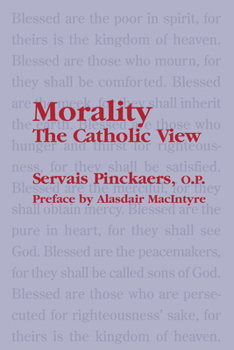Morality: The Catholic View
Select Format
Select Condition 
Book Overview
Richmal Crompton's William is known even to those who have never read the books featuring his anarchic exploits. For many, the scruffy, adventurous and exuberant William and his trials and... This description may be from another edition of this product.
Format:Paperback
Language:English
ISBN:1587315157
ISBN13:9781587315152
Release Date:November 2003
Publisher:St. Augustine's Press
Length:152 Pages
Weight:0.57 lbs.
Dimensions:0.5" x 5.9" x 8.9"
Customer Reviews
4 ratings
Morality: The Catholic View
Published by Thriftbooks.com User , 15 years ago
The book is in very good condition and I received in a very timely manner.
Clarity for Morality
Published by Thriftbooks.com User , 19 years ago
Pinckaers very clearly and concisely shows that Christian morality is about fulfilling our longing for happiness, excellence, joy, and truth. The end is not merely to obey commandments but rather to obey commandments in order to be truly happy. The power to walk that path of obedience comes not from dry logic but from the gifts of the Holy Spirit that animate the virtues of a Christian. Most telling is Pinckaers' distinction between mere pleasure and joy as two radically different conceptions of happiness. Many of our life-changing moral decisions come down to the choice between transient, superficial pleasure that is illusory and ends in bitterness and even hatred, while true happiness is, in the words of Augustine, "joy born of the truth" (p. 77). Pinckaers describes the path of happiness that ends in lasting joy, not the path of mere pleasure ending in disappointment.
The Pursuit of Happiness
Published by Thriftbooks.com User , 22 years ago
This is an introductory text of unusual depth and breadth. Father Pinckaers' thesis is that since the 14th century moral philosophy and theology have posited human freedom as primary to human nature. From this premise have come a series of "moralities of obligation" in which freedom is seen as restricted by externally imposed moral rules. Almost by definition, such a model tends to disassociate happiness from morality.According to Pinckaers, a better, more classical, and more Thomistic approach is to consider human freedom as part of human nature, rooted in and ineradicably woven among our yearnings for the good, the beautiful, and the true. Thus the best use of our freedom is virtue, which is not only compatible with happiness but in its highest form (i.e., love) is the source of joy.Pinckaers' analysis of the fundamental flaw of modernist ethics is penetrating and, in my view, probably correct. The concept of human nature presented here is a high one, and may strike some as too exalted. But that's the point. Catholic morality looks to humanity as it was intended to be, and as it can be when redeemed by grace.
A brief but lucid presentation
Published by Thriftbooks.com User , 22 years ago
This tiny book is, apparently, a condensation of the author's more scholarly "The Sources of Christian Ethics". It is written at a level suitable for those with little or no philosophical background, though even the studied can benefit from his forthright discussion of some of the more difficult topics. The book is divided into two parts : a survey of the sources of Christian ethics, and a proposal for renewing our moral thought by a return to the classical and mediaeval models. Thus he discusses the sources for ethical reflection in the Gospels and the other New Testament documents (notably the Sermon on the Mount), then relates how these ideas were grafted onto the Greek philosophical tradition by the mediaevel thinkers. He dwells at (comparative) length on the structure of ethics as it was conceived by Thomas Aquinas in the 13th century; namely, morality is a search for human happiness and fulfillment. He then relates how this ancient ethical tradition was undermined in the late mediaeval period (it is William of Ockham who gets the lion's share of the blame), and how a new conception of Christian ethics as "ethics of obligation" came to dominate in the post-Reformation period. Finally, he discusses the impact of the Vatican II on Catholic moral reflection, in which he sees hope for a return to the ancient model. The second part of the book is a reflection on how ethics might be reconceived in the image of Aquinas' ethics. In particular, he argues that our notion of freedom has to be fundamentally changed if we are to refound moral thought, for the dominant notion of freedom in modern times - what he calls 'freedom of indifference' - is at the root of the chaotic state of morality in western society. In opposition to the prevalent idea of freedom as the ability to choose without bias between contraries, he advocates 'freedom for excellence', which is the ability to act with excellence in whatever one chooses. His discussion of this issue is the best and clearest that I have encountered. He goes on to a number of other topics, including the relationship of freedom and natural law, and the specifically Christian understanding of morals in relation to the Church and the work of the Holy Spirit. I recommend this book to anyone who is discouraged with the present cacophonous state of moral discourse in terms of restrictions, rebellion, and rights; to students of intellectual history who want to better understand the nature of the break modernity has made with the Greeks and mediaevals; to those who are curious about the Catholic view of morality. Readers of Alasdair MacIntyre (who contributes the introduction to this book) and Josef Pieper should find much to enjoy.






